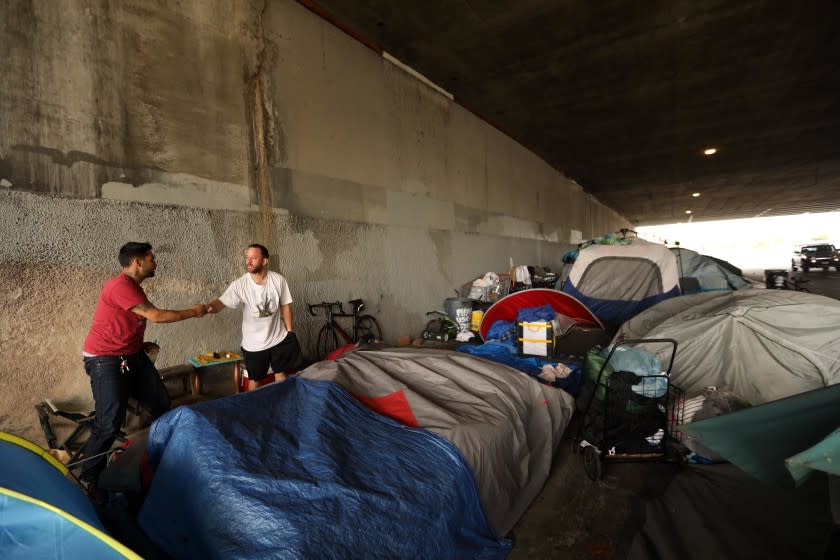Opinion: A billion dollars to help homeless people should get them into housing

The city of Los Angeles may spend $1 billion trying to make a dent in homelessness next year. That’s a phenomenal amount of money, but of course homelessness is a phenomenally difficult problem. The actual number is $955 million — and it includes $164 million left unspent in the current year that is getting rolled into the new figure. That’s what Mayor Eric Garcetti is expected to propose in his budget for the upcoming fiscal year that will be sent to the City Council and made public on Tuesday. For comparison's sake, the amount being spent on homelessness when Garcetti took office in 2013 was about $10 million.
Also, a chunk of this money — $362 million — comprises funds going to permanent housing projects under Proposition HHH. That’s the city bond measure that funds a long list of developments in various stages of funding. That money is already committed, it's just due to be spent in the next fiscal year. Nearly 1,900 units are expected to start construction then, but other projects already in the process of development and construction will be drawing on some of those funds as well.
What the city really needs is more permanent housing. Because as we all know, the 8,000 or so units that will eventually get completed with $1.2 billion in HHH bond money will not fill the need for housing for the city’s estimated 41,000 homeless people.
Homelessness prevention is key to staunching the flow of people into homelessness, and the mayor has proposed setting aside $35 million for homelessness prevention and eviction defense. Is that enough? Probably not.
The city has also set aside $43 million for Project Roomkey, the hotel leasing program which allows the city to put up homeless people in hotels and motels at least temporarily. The city expects to have more than 1,400 rooms in the program through September. It’s good that the city has held onto those rooms in the program, although the city needs about 10 times that number. But it’s been difficult to get new hotels to come into the program when they see tourism and travel picking up now. The money currently being used to pay hoteliers and contractors is supposed to be reimbursed completely by FEMA. It’s just takes forever to get FEMA to do so. At any rate, Roomkey is a temporary program — although there is some talk about stretching it out further than September.
The real question is whether any of this money can be leveraged to construct housing. There is a lot of interest in building with more innovative, less expensive materials, and that may be the way to go. There is a big chunk of money in this budget from the last federal COVID-19 relief bill: $100 million. Still, that’s only a fraction of the $1.3 billion that the city is getting from the measure. City officials say to check the details in the new budget on Tuesday to see the plans for the rest.
But we know this: HUD Secretary Marcia Fudge has said she wants to see the federal money go to temporary and permanent housing for homeless people — and not to group shelters.
I would like to see that too. In all likelihood, the city will get $200 million to $300 million more from the state for the Project Homekey program to buy hotels and motels and convert them into permanent housing for homeless people.
I want to see a chunk of the funds here go to putting people into permanent housing of some kind — and not just thousands of tiny houses.
This story originally appeared in Los Angeles Times.

